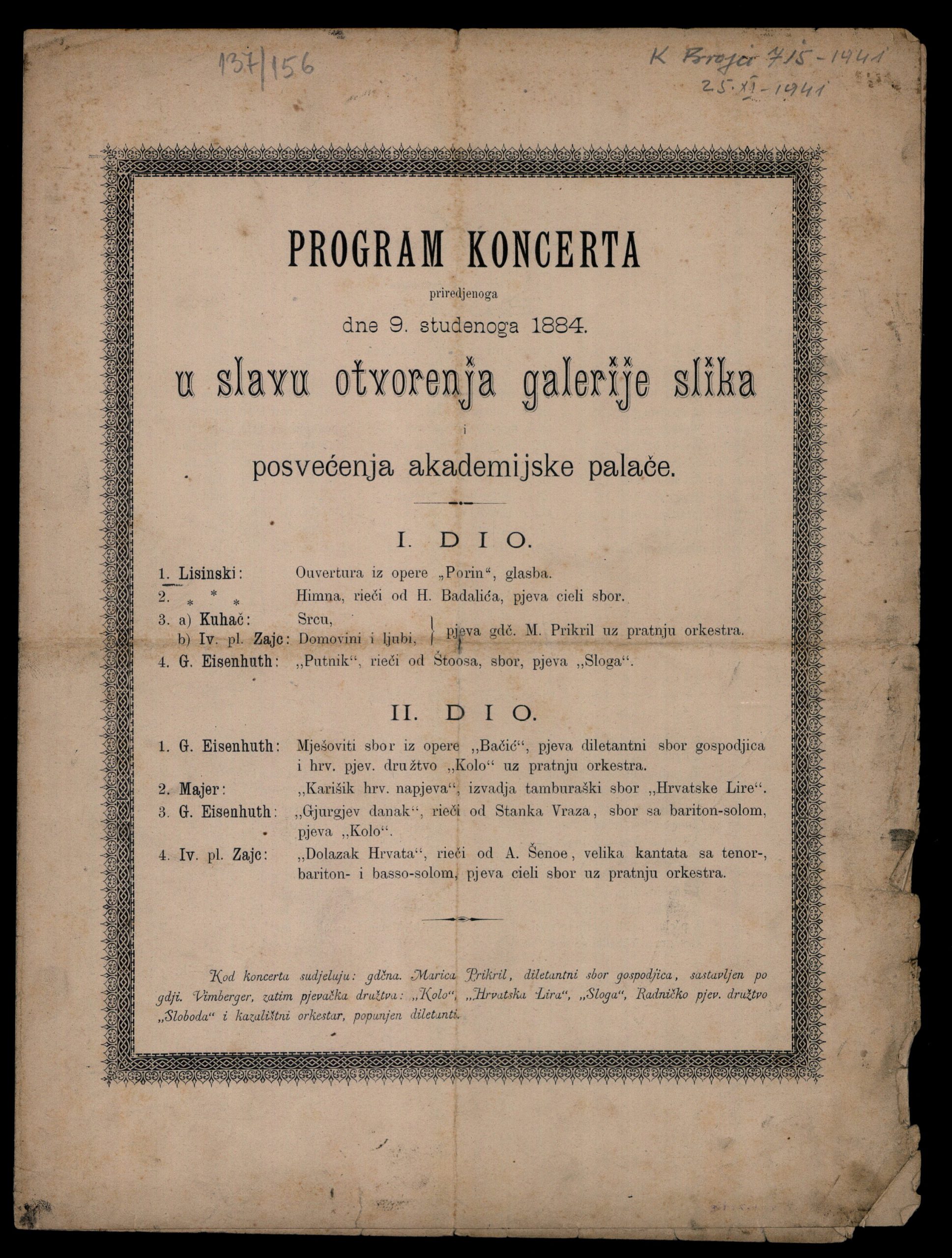On Sunday, November 9th, many citizens gathered on Zrinski Square before 10 o’clock in the morning. The fire brigade’s musical band led by bandmaster Leifert also arrived, followed by all of the city’s societies carrying insignia half an hour later. The society of fire fighters and war veterans stood in two roads spanning from the Vranyczany palace to the Academy, in front of which various ceremonial delegations were positioned.
As early as 10 o’clock yesterday, the porticoes of the Academy’s courtyard began to fill up with the most gentile guests, even though the ceremony itself would not start until 11 o’clock. On the ground floor, a long table covered in green linen was arranged, surrounded by tasteful chairs for the Yugoslav academicians, and one soaring and more ornate than the others positioned in the middle, intended for the President of the Academy, but which was yesterday occupied by its very founder. In front of the table and chairs for the academy members, places were set for dignitaries, delegations, and guests of honor. Around 10:30, the building was already completely full.(from: “In the Academy’s palace”, Pozor, 10th November 1884)
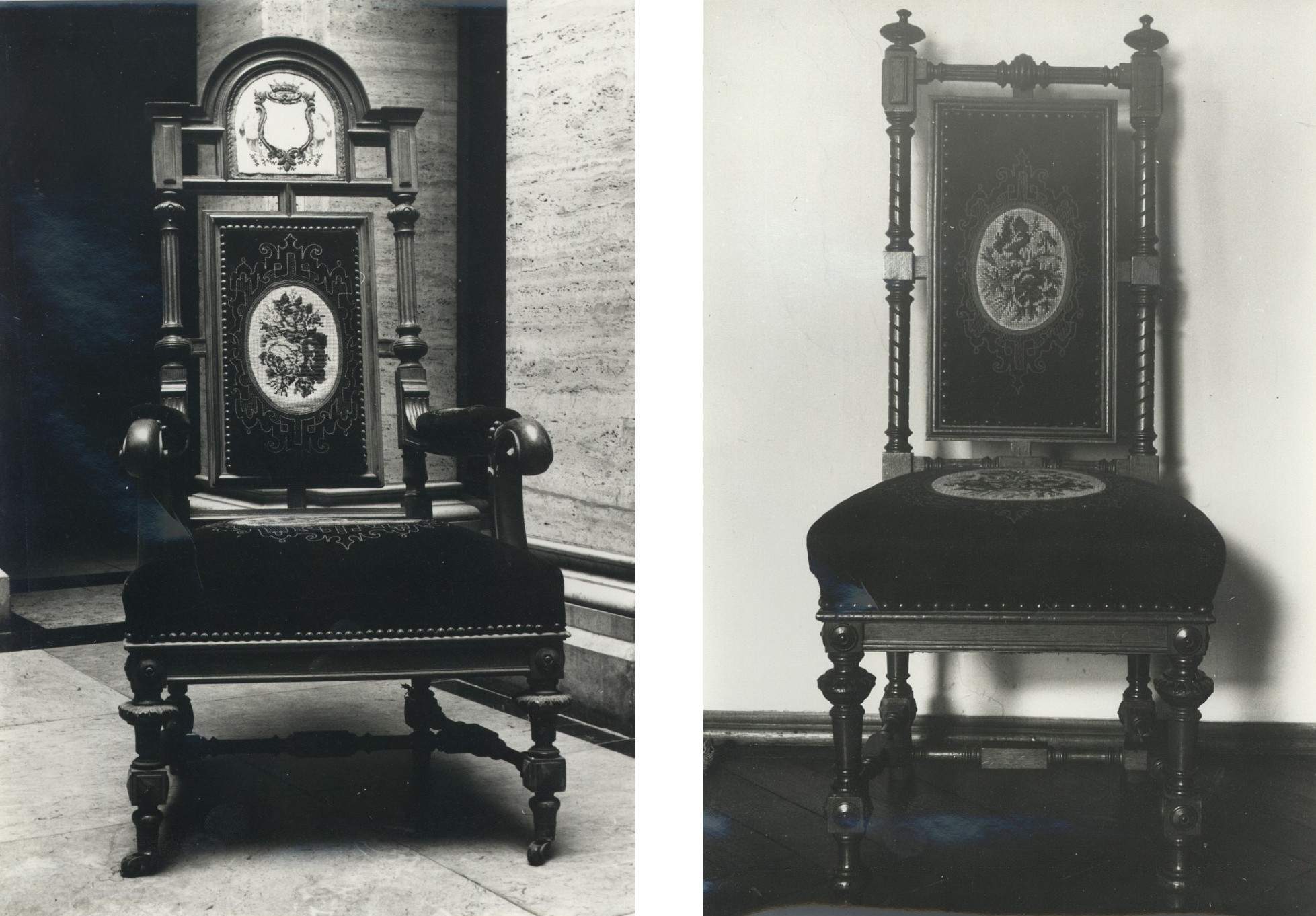
The Bishop arrived at 11 o’clock, passing from the entrance to the presidential table in the atrium through a lane of around thirty young ladies from the most respectable families, dressed in white, followed by cheers and applause. Contemporary newspapers report that the gathered masses filled the lobby and all of the galleries of the first and second floors. The first rows were occupied by: Ivan Mažuranić, Vice Marshal Đuro Jelačić, bishops Posilović, Hranilović and Pavlešić, the Great Prefect of Zagreb Ivan Vardian, department heads Danilo Stanković and Ivan Vončina, retired department heads Derenčin, Muhić and Pogledić, Count Miroslav Kulmer, Baron Ljudevit Ožegović and the barons Vranyczany, conte Buratti, Kosta Vojnović, Ivan Trnski, nobleman Jelačić Jankomirski, Ante Mažuranić, canons of the Cathedral Chapter Gašparić, Gugler, Hrvat, Kržan, Matković, Matunci, Rumpler, Smetiško, Šnap and Veber, canons of the Čazma Chapter Ilijašević and Lehpamer, Zagreb’s Deputy Mayor Đuro Crnadak with the city’s council members, representatives of the Parliament Erazmo Barčić, Andre Bakarčić, Fran Folnegović, Eugen Kumičić, Šime Mazzura, Tito Ožegović and Josip Zorić. The ceremony was also attended by University President Pilar with the entire Senate and numerous professors, members of the Chamber of Trades and Crafts, representatives of the Croatian Heritage Foundation, the boards of all of the city’s societies, as well as delegates from Ljubljana, Karlovac, Sisak, Križevci, Samobor, Jastrebarsko, etc.


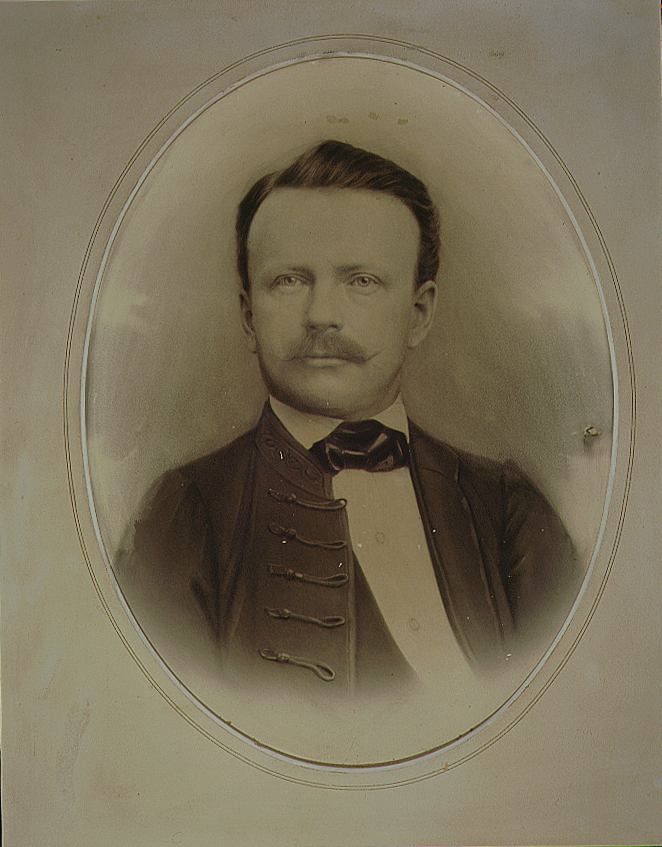
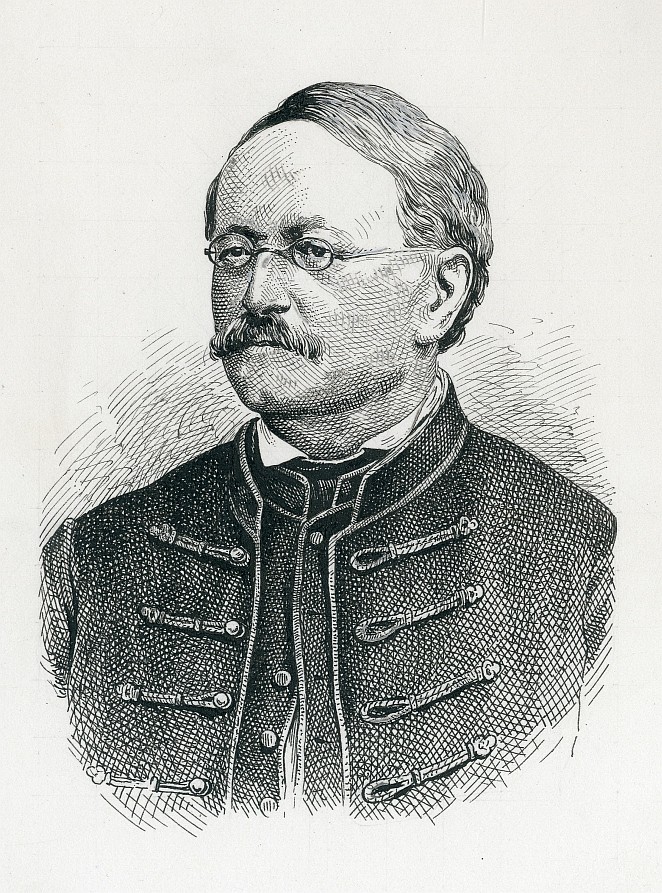
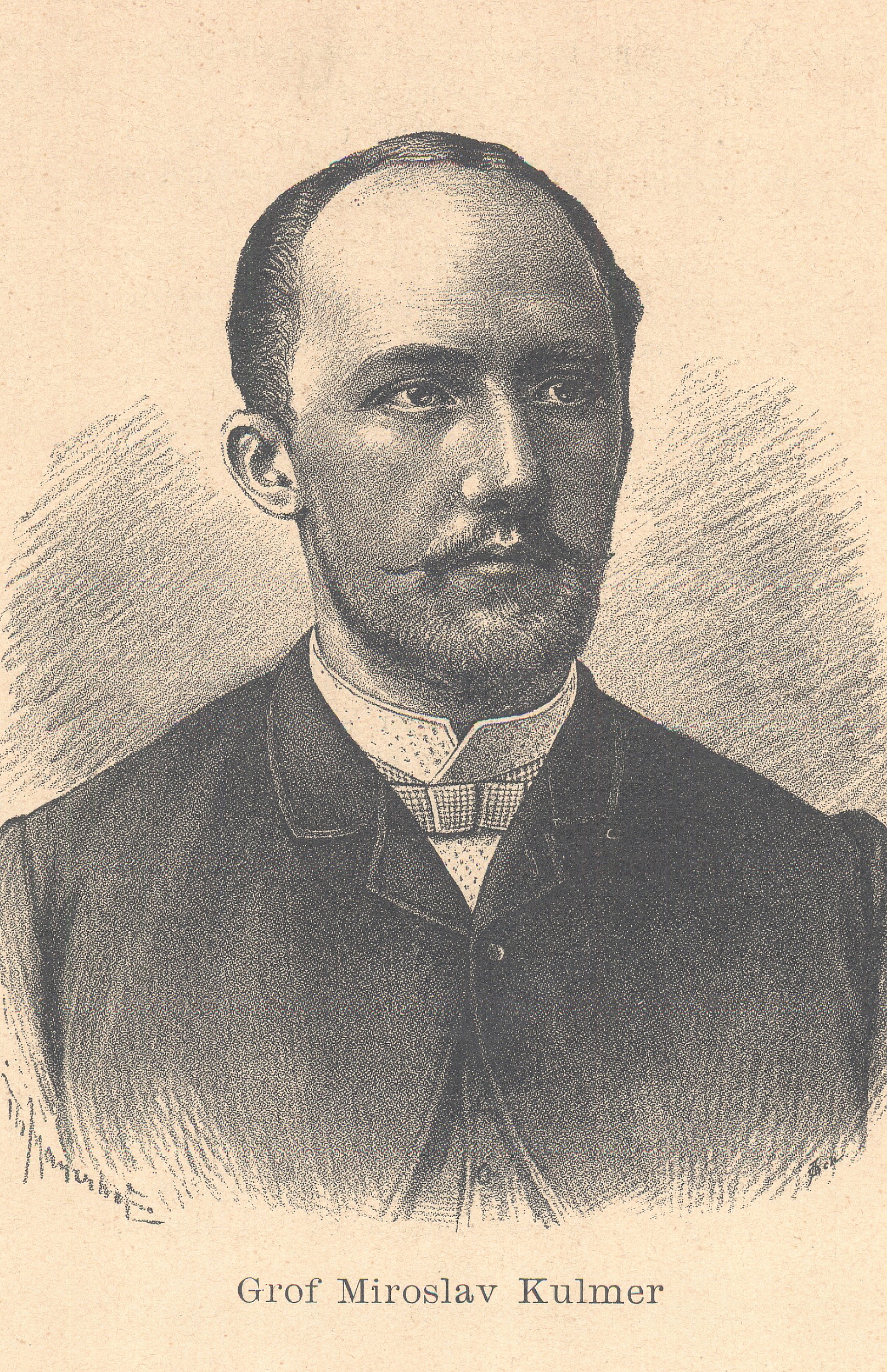
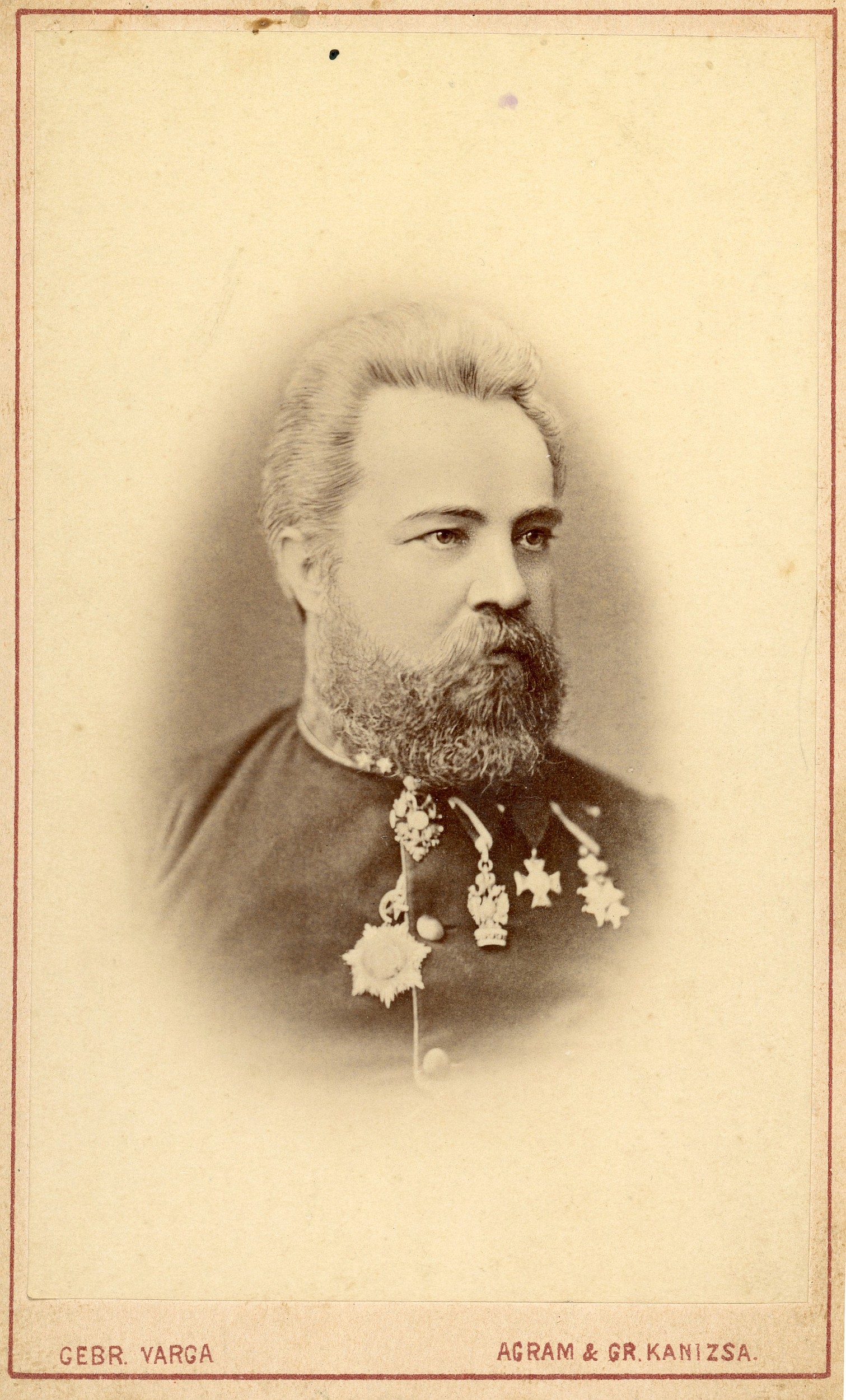

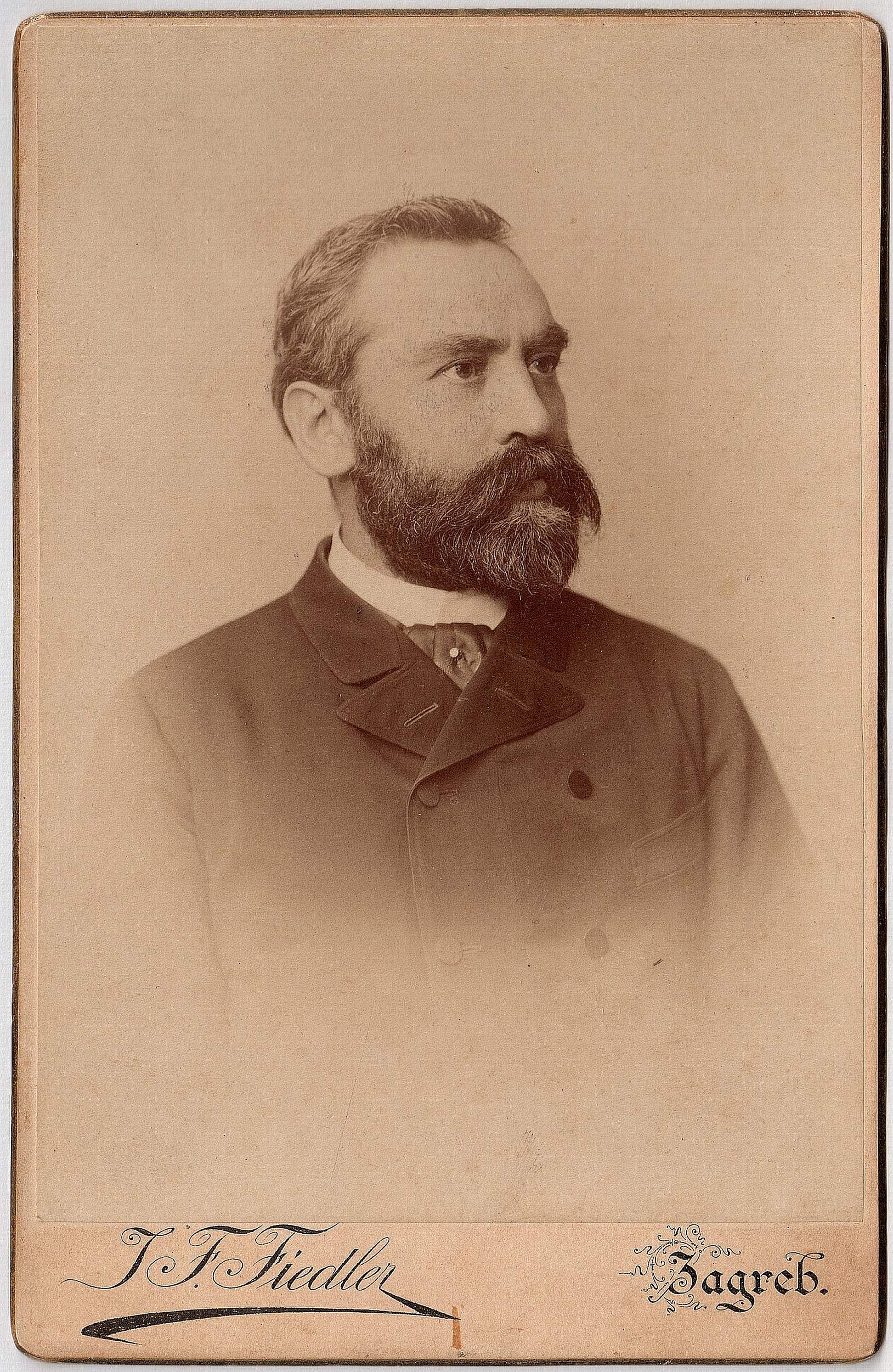
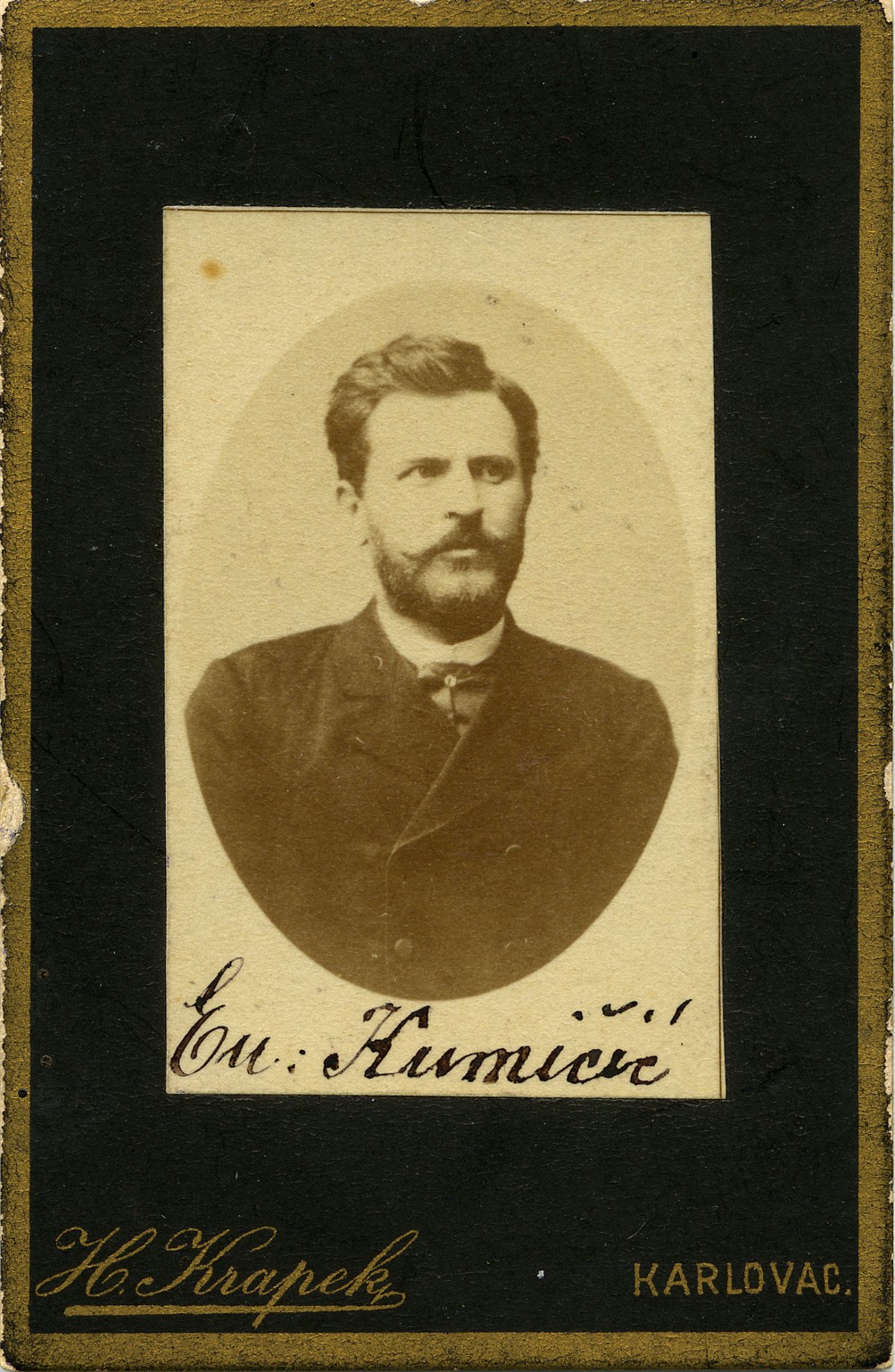
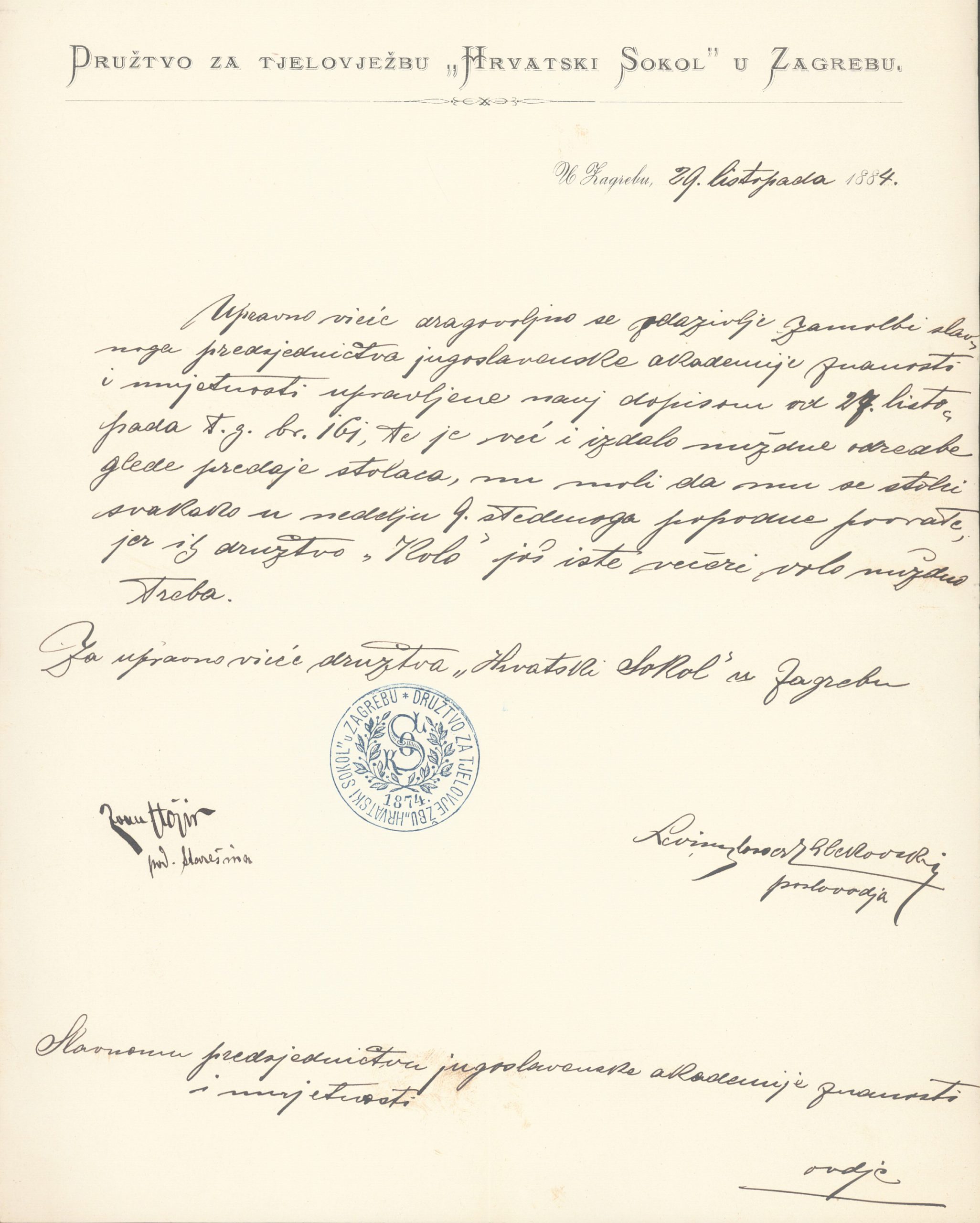
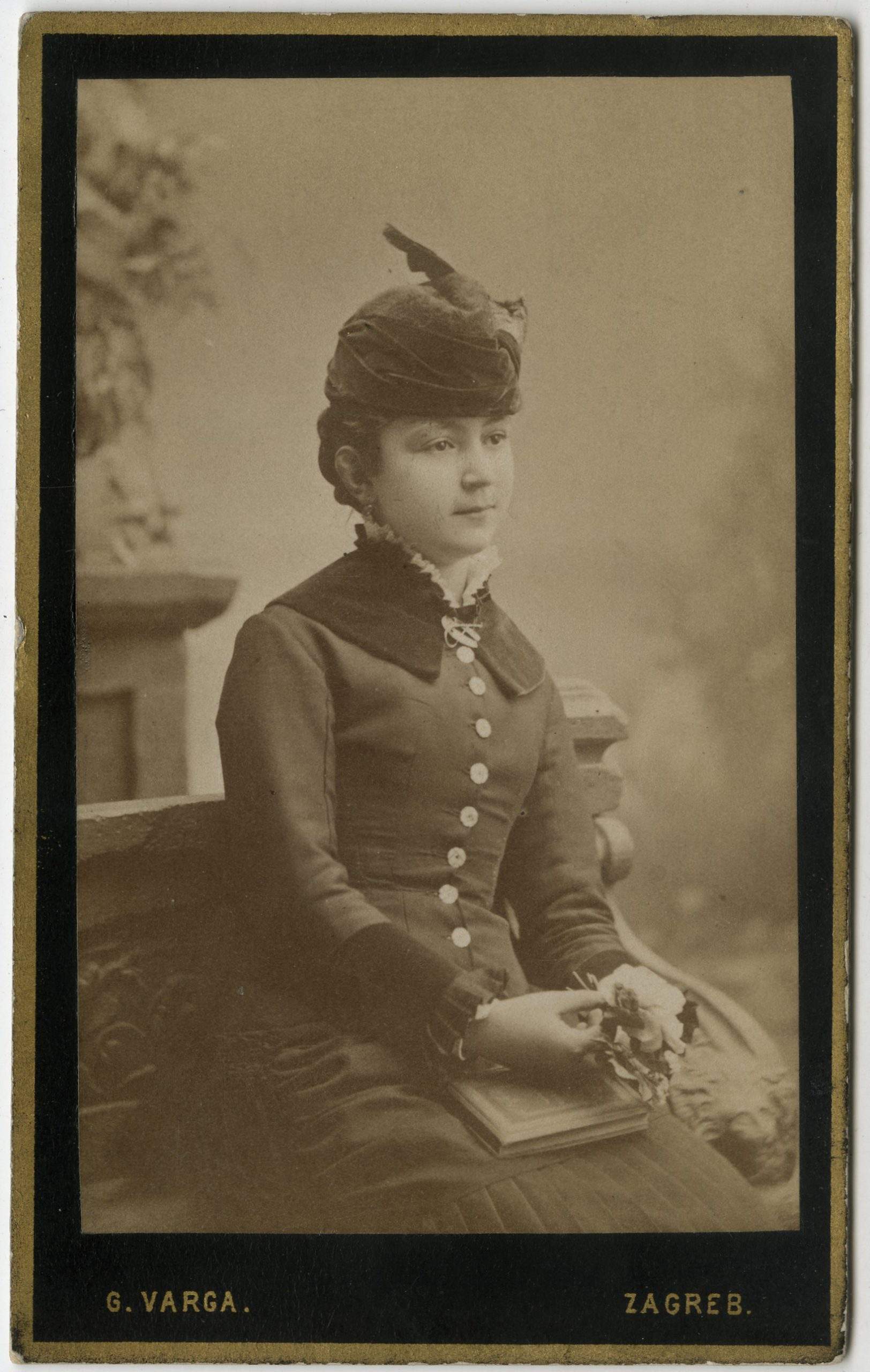
Countess Eugenija Vojnović, daughter of Kosta Vojnović, handed Strossmayer a bouquet of flowers and gave a short, charming speech. With words of thanks, the Bishop went to the adjoining room in order to put on the vestments in which he would hold the service of blessing the Palace in Croatian, accompanied by spiritual music played by the singing societies gathered on the second floor. Newspaper reports are not in agreement as to the number and names of the priests assisting the Bishop in the service: Pozor names the Bishop’s secretary Cepelić and dr. Ivan Bujanović, along with prebendaries Košćec and Rihtarić, of whom only the latter was mentioned with prebendary Pliverić in the Official Gazette. Taking off his vestments after the blessing service, Strossmayer, as patron of the Academy, sat in the presidential chair. Rački sat to his right, secretary Bogoslav Šulek to his left. Second secretary Petar Matković sat next to Rački, while other members of the Academy occupied the rest of the seats.
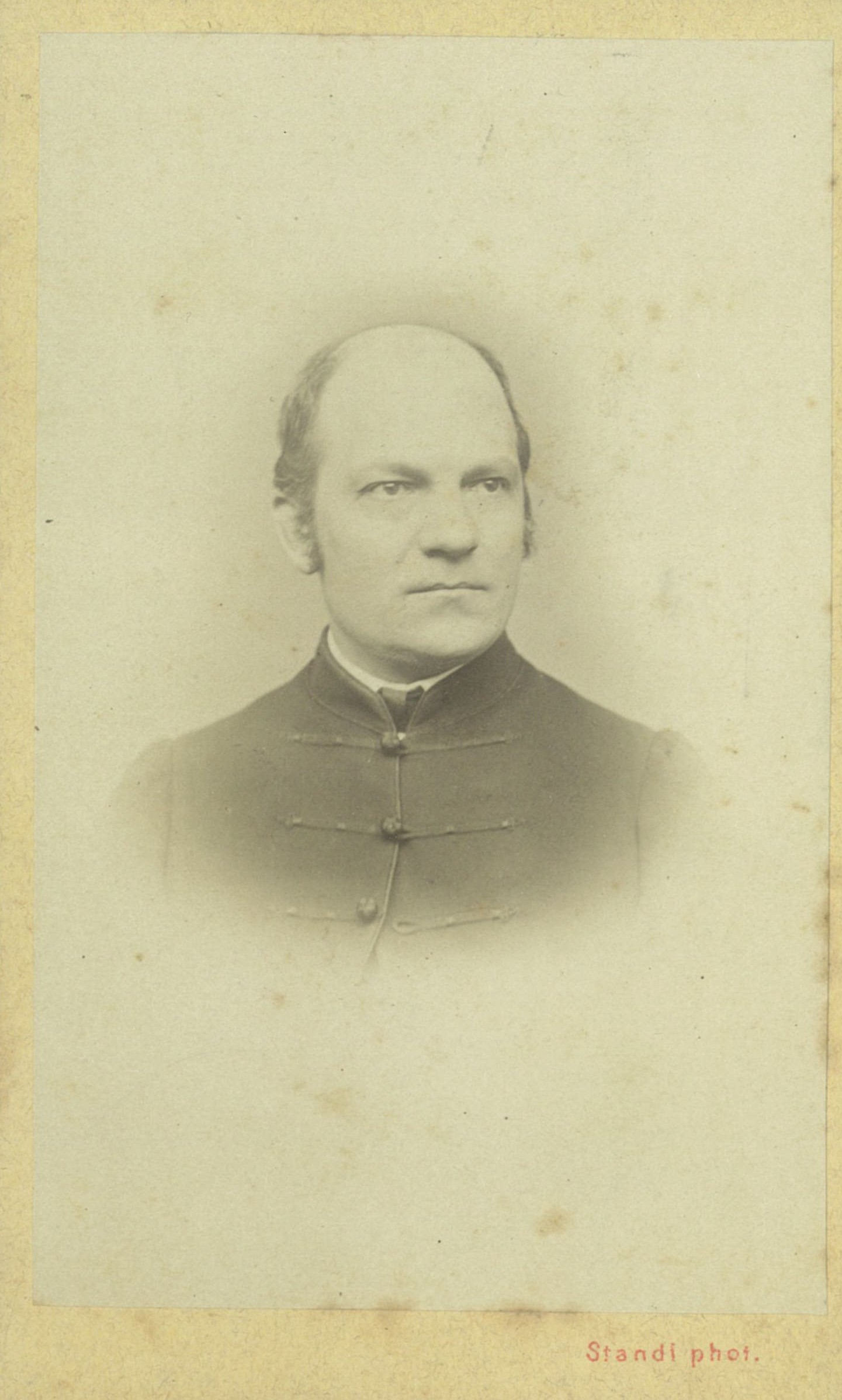
Once the cheering for Strossmayer has subsided, Rački opened the ceremonial session with a fitting speech, in which he mentioned the Bishop’s patronage of sciences and arts, their development, and the gratefulness of the people for all of the good with which Strossmayer indebted them. After Rački, the esteemed patron gave an inspired speech that lasted for almost two hours, which he ended by blessing all who were present, and proclaiming the Gallery open. He was often interrupted by the enthusiastic cheers and salutations of the crowd. To the “Academy’s collection of artworks”, he further gifted the medals of Pope Leo XIII, minted in honor of the great pilgrimage of Slavs to Rome in the year 1881, as well as two illuminated manuscripts on parchment: a breviary from the 14th century, and the Liber officii Beatae Mariae Virginis, known as Strossmayer’s Book of Hours. Cheers of rapture roared from the gathered crowd, followed by a short speech of gratitude by Deputy Mayor Crnadak on behalf of the City of Zagreb – instead of Mayor Hoffman who could not attend because of health issues. After President Rački asked Zagreb’s citizens to allow the most honored guests and those from out of town to tour the Gallery first, the Bishop himself, accompanied by Izidor Kršnjavi, led them to the second floor. The Gallery’s Director played a very discreet role in the entire protocol, while Bollé was ill and on bedrest, according to newspaper reports. The Gallery tour took around 15 minutes, after which the Bishop, followed by a cheering crowd, returned to his temporary abode. Honoring him under the balcony of the Vranyczany palace, the societies carrying insignia dispersed, followed by the rest of the gathered crowd on Zrinski Square. The ceremony ended around 1 p.m.
A luncheon for around twenty dignitaries who attended the ceremony was organized at the Baron’s palace. The role of headmaster was given to Canon Veber, who led many of the toasts. Apart from the King and dynasty, toasts were made for everyone present, especially for the Bishop and the generous host.
Yesterday at noon there was another grand, official luncheon held at the house of our esteemed Baron Ljudevit Vranyczany. Apart from Bishop Strossmayer, attending the luncheon were Vice Marshal, Count Gjuro Jelačić, Baron Dragan Vranyczany with his wife, Baroness Ivka, Baron Vladko Vranyczany, department head Dane Stanković and Ivan Vončina, Bishop dr. Gjuro Posilović, Hranilović and Janko Pavlešić, President of the Academy dr. Franjo Rački, President of the University dr. Gjuro Pilar, Deputy Mayor of Ljubljana Petričić, Deputy Mayor of Zagreb Gjuro Crnadak, representative at the Imperial Council dr. Vošnjak, court adviser and City Council representative Badovinac, Canon Adolfo Veber, department advisor Janko Jurković, University professors dr. Kosta Count Vojnović and dr. Fran Vrbanić, the great merchant from Karlovac Turković, Secretary of the Bishop of Djakovo Cepelić, and Academy member and secretary Radoslav Lopašić.
It does not need mentioning that an array of zealous and wonderful toasts was given around the table, presided over by Canon Veber. It is understood that, along with toasts for his Majesty and the Dynasty, the greatest were those addressing the eminent Bishop Strossmayer and the esteemed host. Finally, we should also mention the toast made by the headmaster, the eminent Count Gjuro Jelačić, to which Bishop Strossmayer replied with an appeal that the Count arrange a ceremonious transfer of the remains of the deceased Ban Jelačić to the family’s new tomb, and he himself would attend on foot if necessary, to bless the tomb. Heb said that he was convinced that all patriots would also participate in this act, as it would be deserving of the memory of that honored and glorious man. The late Ban’s brother, Count Gjuro Jelačić, promised to fulfill the Bishop’s wish, which the gathered guests saluted with special gratitude.
Finally, there is one more piece of joyous news that we need to report from yesterday’s luncheon. When Duke Kosta Vojnović, as the representative of the Provincial Council of Dalmatia, toasted Bishop Strossmayer on behalf of Dalmatia, he stressed that the Bishop, with all his good deeds, still owes Dalmatia something, and that is to visit it in person. To this, the Bishop replied that, God willing, he would do so the following year, but not only because it is what Dalmatia wishes, but because it is his own heart’s desire.
(from: “Feasts at Baron Ljudevit Vranyczany’s”, Pozor, 10th November 1884)
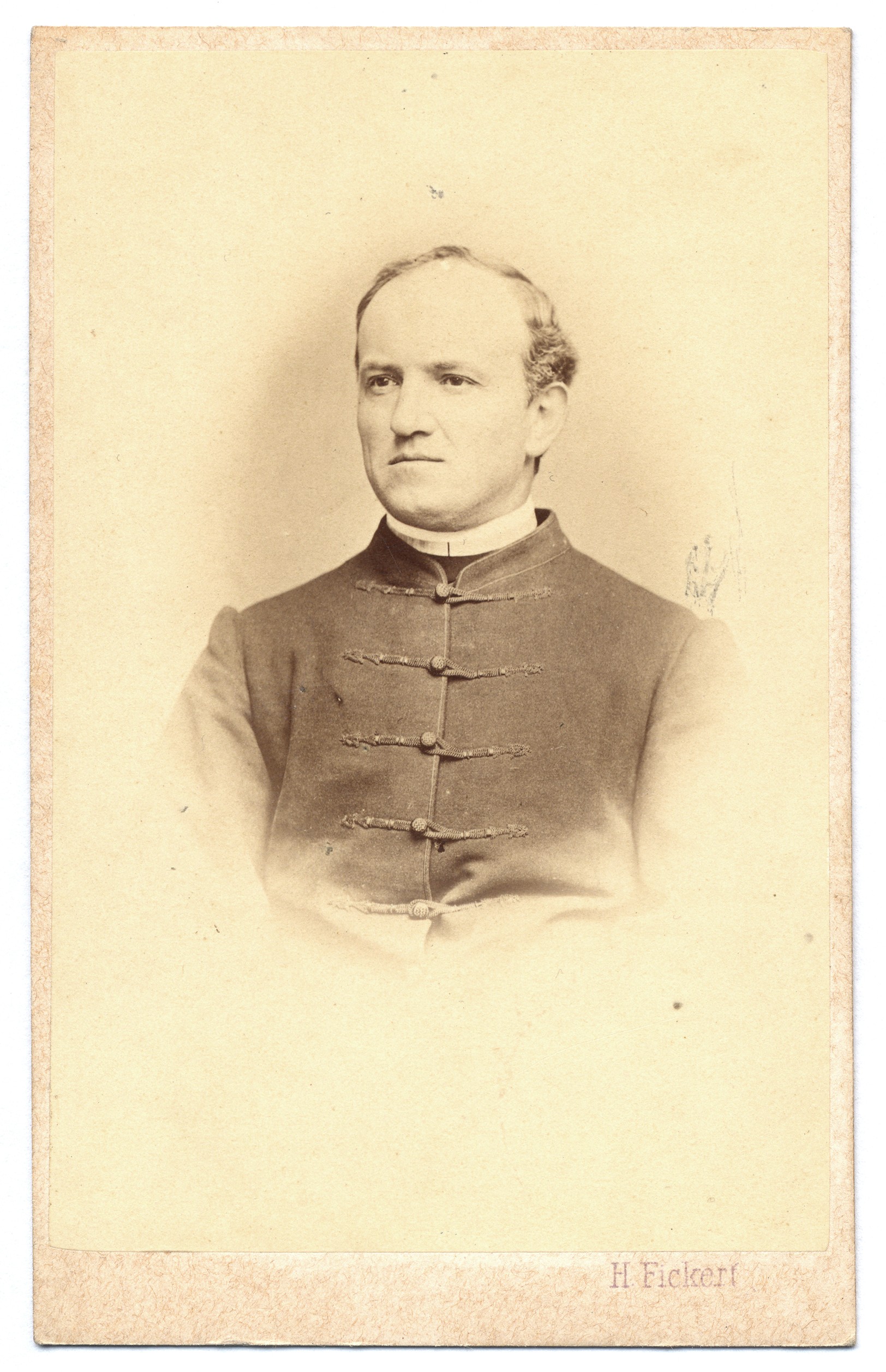
Several patriotic well known citizens of Zagreb organized a dinner party for around seventy guests from other cities, mainly leaders and members of delegations and the parliament, at the inn At the Austrian Emperor.
Zagreb was not the only city celebrating Bishop Strossmayer. The whole of Croatia, along with its neighboring regions of Dalmatia, Slovenia and Bosnia, joined in the celebration. Some patriotic citizens of Zagreb organized a grand dinner on the first floor of the inn At the Austrian Emperor for guests who came from abroad. At two o’clock, seventy-five great faces sat around the table, among whom were leaders and some members of delegations, especially from Slovenia, representatives from the white City of Ljubljana, which fondly follows all events that take place here. The esteemed Fr. Pogledić presided over this event, while the role of headmaster was given to our beloved senator, Gjuro Deželić, who began an array of speeches with a toast to Their Majesties, the King and Queen. All guests rose to their feet and the hall reverberated with the words “Long live the King”.
Of course, a toast to Bishop Josip Juraj Strossmayer ensued, as he lit the torch of education in our land, and a flame of love and gratitude in our hearts. The headmaster knew how to string toasts together in such a way that none could refuse to cheer “Long live!” Long live the Academy! Long live Zagreb! Long live Slovenia! Long live the real representatives of Croats in Rijeka!, etc., and long live our patriotic nobleman, Baron Lujo Vranyczany, glory to him for having opened his kingly halls to our treasured guest.
Of the guests from Primorje, a brief yet concise speech was given by our patrician from Rijeka and representative of the people, Mr. Erazmo Barčić and Fran Folnegović, while Mr. Hribar, a citizen of Ljubljana, spoke on behalf of our Slovenian brothers. His address was significant, as it expressed the feelings which all people of Slovenia bear for Croatians, taking joy in their progress and marveling at the great importance of our patron, who, if he had the millions of Makay or Vanderbilt, would without a second thought sacrifice them all at the altar of the Croatian people. The pronouncements of all delegations, especially those from Sisak delivered by Mayor Lovrić and representative Pavlica, from Križevci through com. Marković, from Ljubljana through Mr. Vaso Petričić, from Karlovac through Mr. Banjavčić, and from Dalmatia through Mr. Ante Polić, mentioned with pride their boundless sympathy for our capital city, Zagreb.(from: „The banquet at the inn At the Austrian Emperor”, Pozor, 10th November 1884)
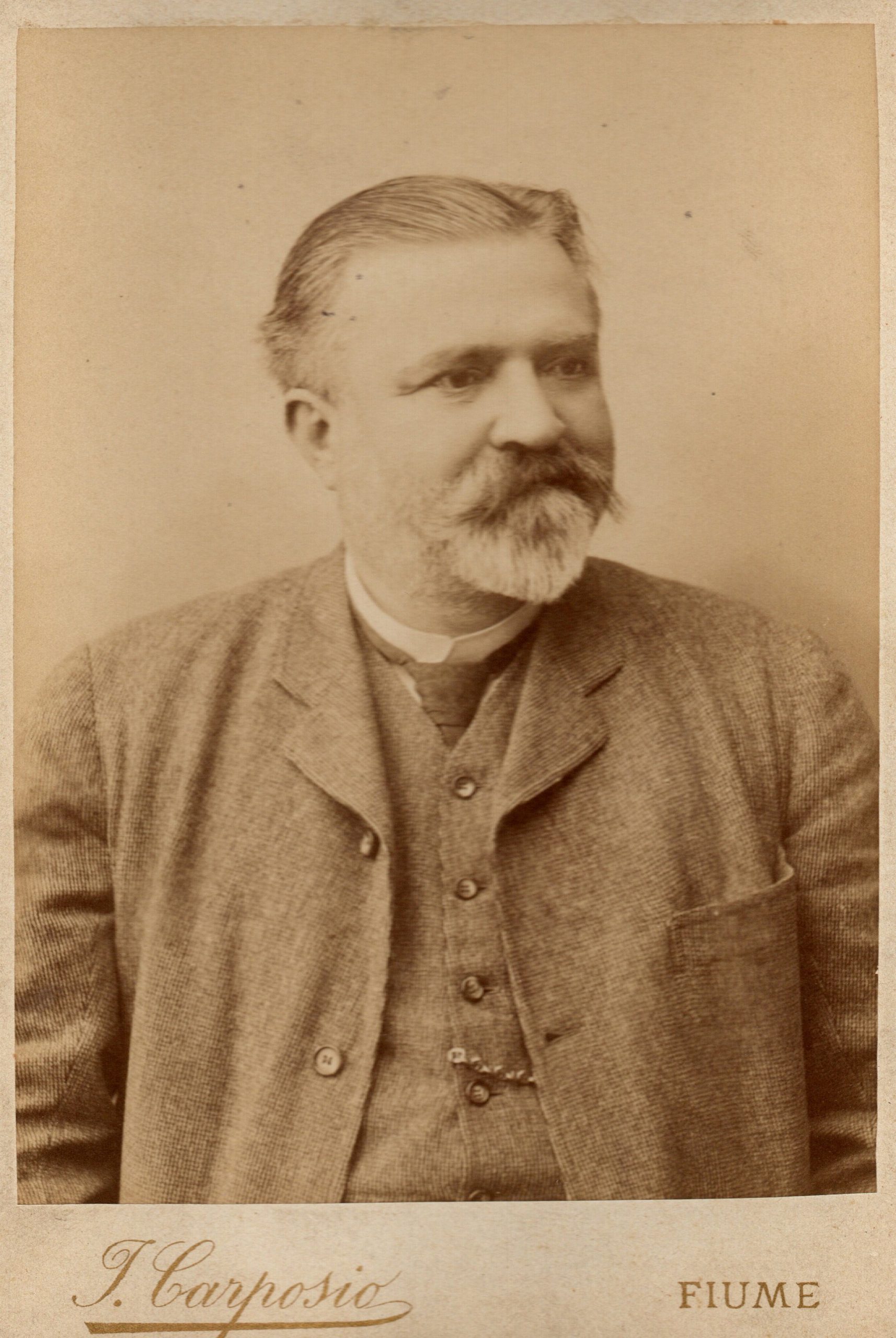
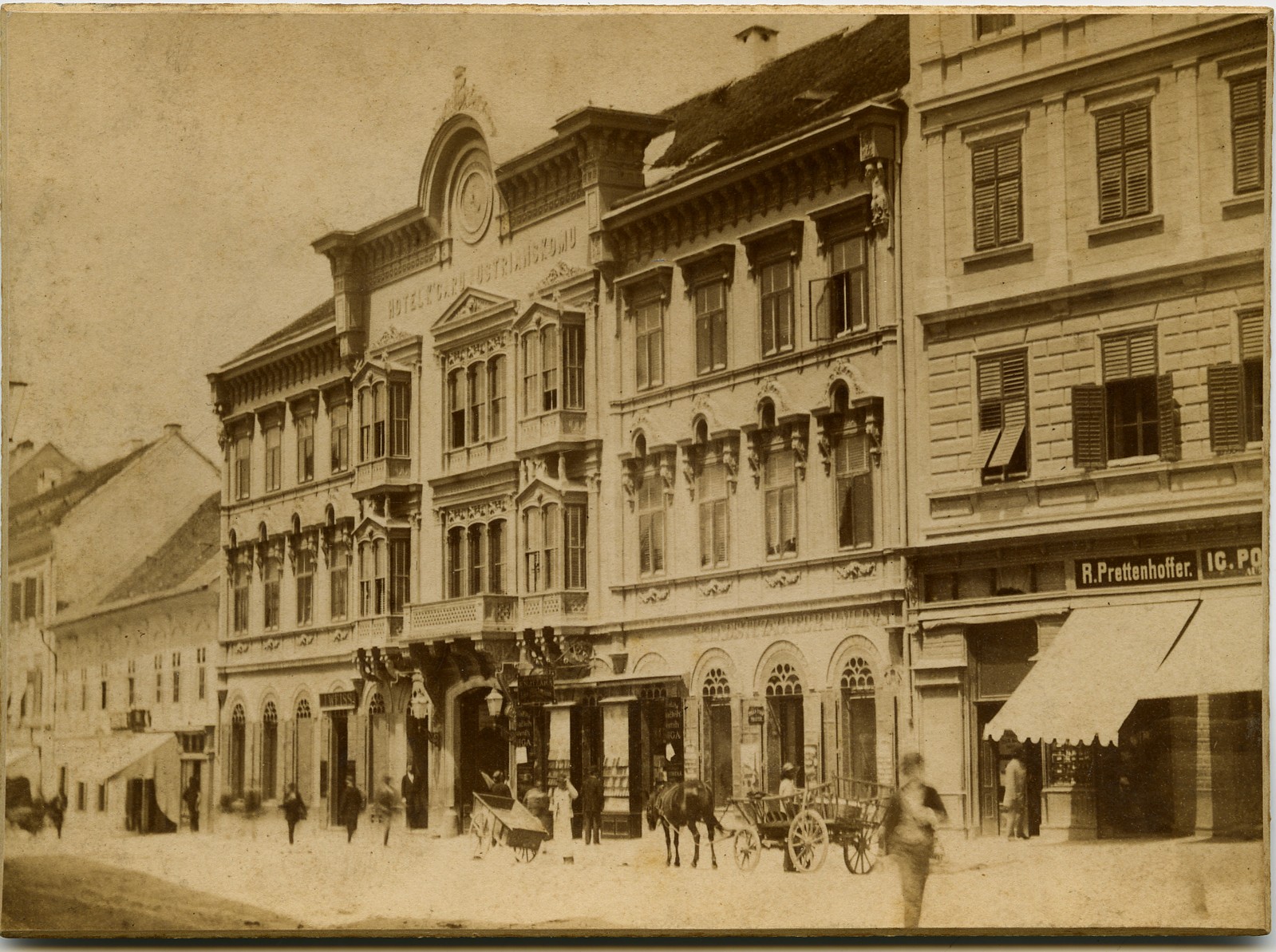
At 4 p.m., the comedy Barun Franjo Trenk (Baron Francis Trenk) by Josip Eugen Tomić was staged at the Theater and seen by Strossmayer from the second act onwards. Even there his presence was accompanied by ovations.
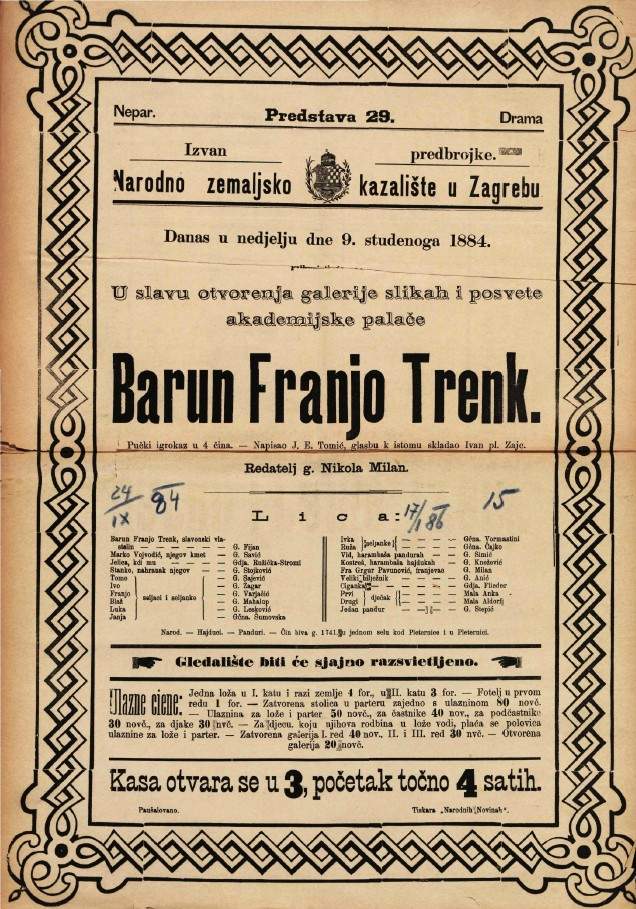
The series of events organized for the two-day celebrations was concluded with an evening concert held at the City firing range, whose great hall was filled with dignitaries soon after 7 p.m. An hour later, the Bishop arrived accompanied by the sound of trumpets, and with general cheers and a standing ovation. Newspapers from the time did not fail to report that the program “was not put together very successfully”, although it was mostly well executed.
Poslušajte zvučni zapis Domovini i ljubi
First, the amateur orchestra played the overture of the opera Porin by Vatroslav Lisinski, after which the choir, comprising almost one hundred and fifty singers, performed the anthem-like composition based on the text by Hugo Badalić. Miss Prikril, who played the role of Jelena in the opera Nikola Šubić Zrinski by Zajc the previous evening, sang Srdcu by Franjo Kuhač and Domovini i ljubi by Ivan Zajc, for which she received flowers and an applause.
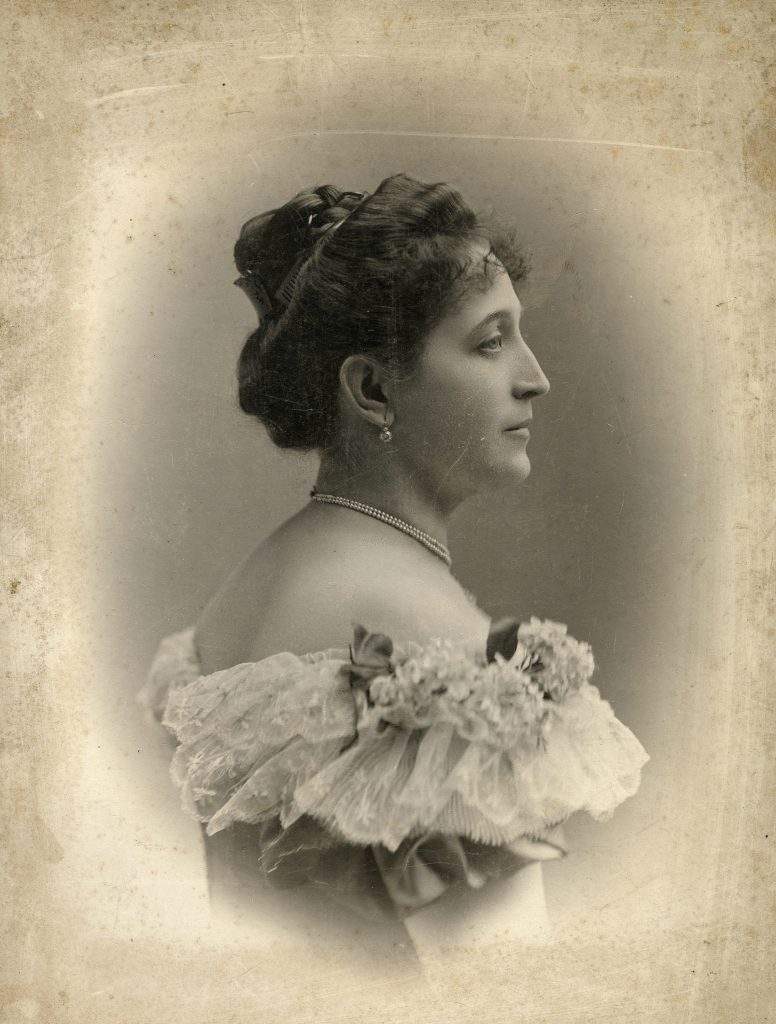
This was followed by Putnik (The Traveler) by Gjuro Eisenhuth performed by the singing society Sloga, and a sequence from the opera Bačić by the same composer performed by the mixed choir of the society Kolo and the “amateur girls’ choir”, which was repeated after a standing ovation. Most of the performances were conducted by Gjuro Eisenhuth. Also performed were the Karišik hrvatskih napjeva, Povraćanac and Slavonian national dance, after which the Bishop stood up and congratulated the young conductor Mayer. Finally, Kolo sang Eisenhuth’s lengthy Gjurgjev danak, and the whole choir and musicians performed the cantata Dolazak Hrvata (Arrival of the Croats) by Zajc.
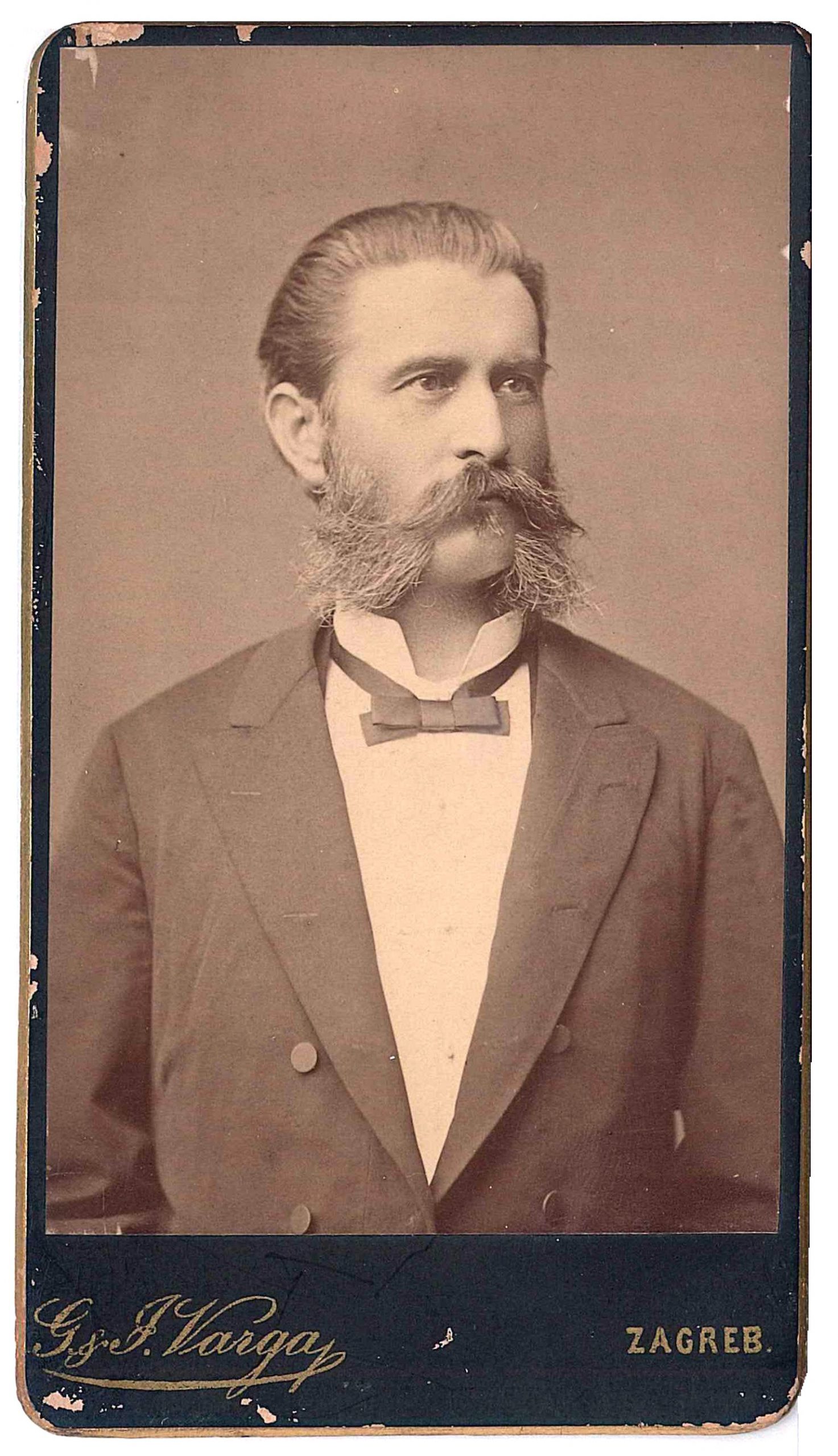
After the concert had finished, the Bishop stayed for a short while at the great hall, and then at the small hall of the Firing range as well, for an exchange of ceremonial words of gratitude and salutations with representatives of Zagreb and a toast and animated conversation with individual guests. At his farewell, he bowed while the gathered guests cheered as he exited. The festivities continued with dancing until the dawn.
After the concert, the greatest ladies came to bow to his Excellence, among whom was the young widow of the late August Šenoa, dressed in black. The Bishop’s eyes filled with tears as he blessed the poor soul, gave her his sacred hand, at which the widow humbly bowed her head and touched her trembling lips to it, covering it with tears of gratitude.(from: “Opening ceremony of the Strossmayer Gallery of Pictures in Zagreb on 8th and 9th November 1884”, Zvonimir, 1886)


